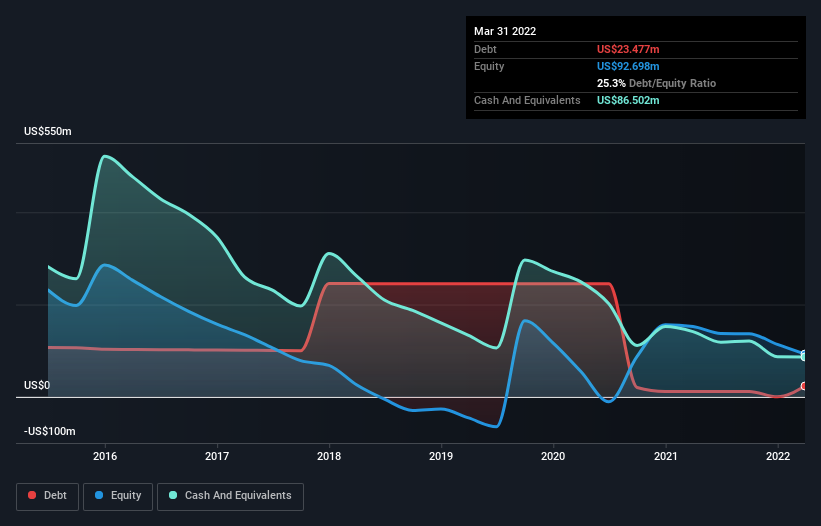Stock Analysis

Howard Marks put it nicely when he said that, rather than worrying about share price volatility, 'The possibility of permanent loss is the risk I worry about... and every practical investor I know worries about.' So it might be obvious that you need to consider debt, when you think about how risky any given stock is, because too much debt can sink a company. We can see that Lexicon Pharmaceuticals, Inc. (NASDAQ:LXRX) does use debt in its business. But is this debt a concern to shareholders?
When Is Debt A Problem?
Debt is a tool to help businesses grow, but if a business is incapable of paying off its lenders, then it exists at their mercy. Ultimately, if the company can't fulfill its legal obligations to repay debt, shareholders could walk away with nothing. However, a more frequent (but still costly) occurrence is where a company must issue shares at bargain-basement prices, permanently diluting shareholders, just to shore up its balance sheet. Of course, debt can be an important tool in businesses, particularly capital heavy businesses. When we think about a company's use of debt, we first look at cash and debt together.
See our latest analysis for Lexicon Pharmaceuticals
What Is Lexicon Pharmaceuticals's Debt?
You can click the graphic below for the historical numbers, but it shows that as of March 2022 Lexicon Pharmaceuticals had US$23.5m of debt, an increase on US$11.7m, over one year. However, it does have US$86.5m in cash offsetting this, leading to net cash of US$63.0m.

A Look At Lexicon Pharmaceuticals' Liabilities
Zooming in on the latest balance sheet data, we can see that Lexicon Pharmaceuticals had liabilities of US$18.9m due within 12 months and liabilities of US$24.6m due beyond that. On the other hand, it had cash of US$86.5m and US$37.0k worth of receivables due within a year. So it can boast US$43.1m more liquid assets than total liabilities.
It's good to see that Lexicon Pharmaceuticals has plenty of liquidity on its balance sheet, suggesting conservative management of liabilities. Because it has plenty of assets, it is unlikely to have trouble with its lenders. Simply put, the fact that Lexicon Pharmaceuticals has more cash than debt is arguably a good indication that it can manage its debt safely. When analysing debt levels, the balance sheet is the obvious place to start. But ultimately the future profitability of the business will decide if Lexicon Pharmaceuticals can strengthen its balance sheet over time. So if you're focused on the future you can check out this free report showing analyst profit forecasts.
Since Lexicon Pharmaceuticals doesn't have significant operating revenue, shareholders may be hoping it comes up with a great new product, before it runs out of money.
So How Risky Is Lexicon Pharmaceuticals?
Statistically speaking companies that lose money are riskier than those that make money. And in the last year Lexicon Pharmaceuticals had an earnings before interest and tax (EBIT) loss, truth be told. Indeed, in that time it burnt through US$87m of cash and made a loss of US$90m. Given it only has net cash of US$63.0m, the company may need to raise more capital if it doesn't reach break-even soon. Overall, its balance sheet doesn't seem overly risky, at the moment, but we're always cautious until we see the positive free cash flow. There's no doubt that we learn most about debt from the balance sheet. However, not all investment risk resides within the balance sheet - far from it. Be aware that Lexicon Pharmaceuticals is showing 5 warning signs in our investment analysis , and 2 of those are potentially serious...
If, after all that, you're more interested in a fast growing company with a rock-solid balance sheet, then check out our list of net cash growth stocks without delay.
Valuation is complex, but we're helping make it simple.
Find out whether Lexicon Pharmaceuticals is potentially over or undervalued by checking out our comprehensive analysis, which includes fair value estimates, risks and warnings, dividends, insider transactions and financial health.
View the Free AnalysisHave feedback on this article? Concerned about the content? Get in touch with us directly. Alternatively, email editorial-team (at) simplywallst.com.
This article by Simply Wall St is general in nature. We provide commentary based on historical data and analyst forecasts only using an unbiased methodology and our articles are not intended to be financial advice. It does not constitute a recommendation to buy or sell any stock, and does not take account of your objectives, or your financial situation. We aim to bring you long-term focused analysis driven by fundamental data. Note that our analysis may not factor in the latest price-sensitive company announcements or qualitative material. Simply Wall St has no position in any stocks mentioned.
About NasdaqGS:LXRX
Lexicon Pharmaceuticals
A biopharmaceutical company, focuses on the discovery, development, and commercialization of pharmaceutical products.
Flawless balance sheet with limited growth.

